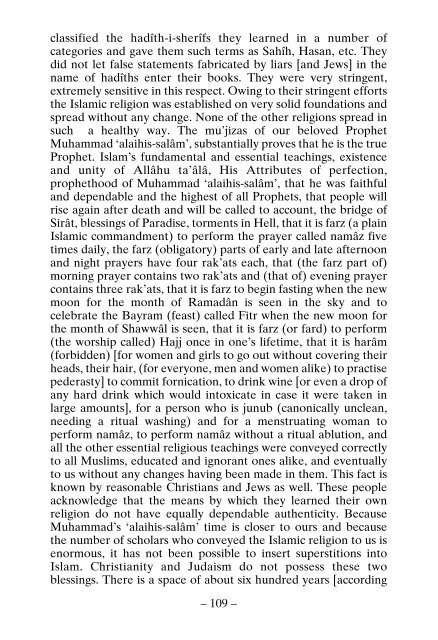Confessions Of A British Spy
Muhammad of Najd was the sort I had been looking for. For his scorn for the time’s scholars, his slighting even the (earliest) four Khalîfas, his having an independent view in understanding the Qur’ân and the Sunna were his most vulnerable points to hunt and obtain him. So different this conceited youngster was from that Ahmed Efendi who had taught me in Istanbul! That scholar, like his predecessors, was reminiscent of a mountain. No power would be able to move him. Whenever he mentioned the name of Abû Hanîfa, he would stand up, go and make an ablution. Whenever he meant to hold the book of Hadîth named he would, again, make an ablution. The Sunnîs trust this book very much. Muhammed of Najd, on the other hand, disdained Abû Hanîfa very much. He would say, “I know better than Abû Hanîfa did. In addition, according to him, half of the book of wrong.
Muhammad of Najd was the sort I had been looking for. For
his scorn for the time’s scholars, his slighting even the (earliest)
four Khalîfas, his having an independent view in understanding
the Qur’ân and the Sunna were his most vulnerable points to hunt
and obtain him. So different this conceited youngster was from
that Ahmed Efendi who had taught me in Istanbul! That scholar,
like his predecessors, was reminiscent of a mountain. No power
would be able to move him. Whenever he mentioned the name of
Abû Hanîfa, he would stand up, go and make an ablution.
Whenever he meant to hold the book of Hadîth named he would, again, make an ablution. The Sunnîs trust this book
very much.
Muhammed of Najd, on the other hand, disdained Abû Hanîfa
very much. He would say, “I know better than Abû Hanîfa did.
In addition, according to him, half of the book of wrong.
You also want an ePaper? Increase the reach of your titles
YUMPU automatically turns print PDFs into web optimized ePapers that Google loves.
classified the hadîth-i-sherîfs they learned in a number of<br />
categories and gave them such terms as Sahîh, Hasan, etc. They<br />
did not let false statements fabricated by liars [and Jews] in the<br />
name of hadîths enter their books. They were very stringent,<br />
extremely sensitive in this respect. Owing to their stringent efforts<br />
the Islamic religion was established on very solid foundations and<br />
spread without any change. None of the other religions spread in<br />
such a healthy way. The mu’jizas of our beloved Prophet<br />
Muhammad ‘alaihis-salâm’, substantially proves that he is the true<br />
Prophet. Islam’s fundamental and essential teachings, existence<br />
and unity of Allâhu ta’âlâ, His Attributes of perfection,<br />
prophethood of Muhammad ‘alaihis-salâm’, that he was faithful<br />
and dependable and the highest of all Prophets, that people will<br />
rise again after death and will be called to account, the bridge of<br />
Sirât, blessings of Paradise, torments in Hell, that it is farz (a plain<br />
Islamic commandment) to perform the prayer called namâz five<br />
times daily, the farz (obligatory) parts of early and late afternoon<br />
and night prayers have four rak’ats each, that (the farz part of)<br />
morning prayer contains two rak’ats and (that of) evening prayer<br />
contains three rak’ats, that it is farz to begin fasting when the new<br />
moon for the month of Ramadân is seen in the sky and to<br />
celebrate the Bayram (feast) called Fitr when the new moon for<br />
the month of Shawwâl is seen, that it is farz (or fard) to perform<br />
(the worship called) Hajj once in one’s lifetime, that it is harâm<br />
(forbidden) [for women and girls to go out without covering their<br />
heads, their hair, (for everyone, men and women alike) to practise<br />
pederasty] to commit fornication, to drink wine [or even a drop of<br />
any hard drink which would intoxicate in case it were taken in<br />
large amounts], for a person who is junub (canonically unclean,<br />
needing a ritual washing) and for a menstruating woman to<br />
perform namâz, to perform namâz without a ritual ablution, and<br />
all the other essential religious teachings were conveyed correctly<br />
to all Muslims, educated and ignorant ones alike, and eventually<br />
to us without any changes having been made in them. This fact is<br />
known by reasonable Christians and Jews as well. These people<br />
acknowledge that the means by which they learned their own<br />
religion do not have equally dependable authenticity. Because<br />
Muhammad’s ‘alaihis-salâm’ time is closer to ours and because<br />
the number of scholars who conveyed the Islamic religion to us is<br />
enormous, it has not been possible to insert superstitions into<br />
Islam. Christianity and Judaism do not possess these two<br />
blessings. There is a space of about six hundred years [according<br />
– 109 –


